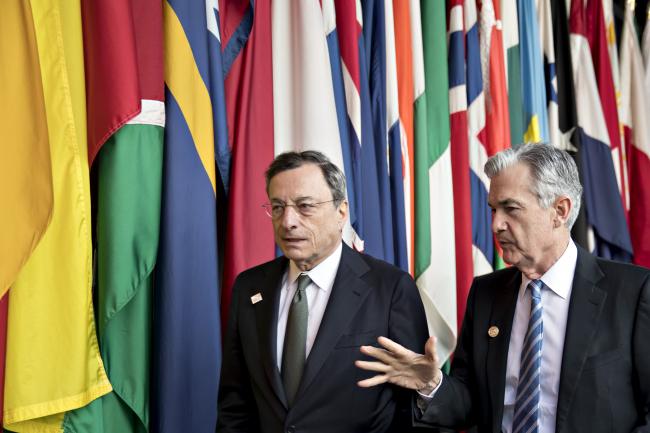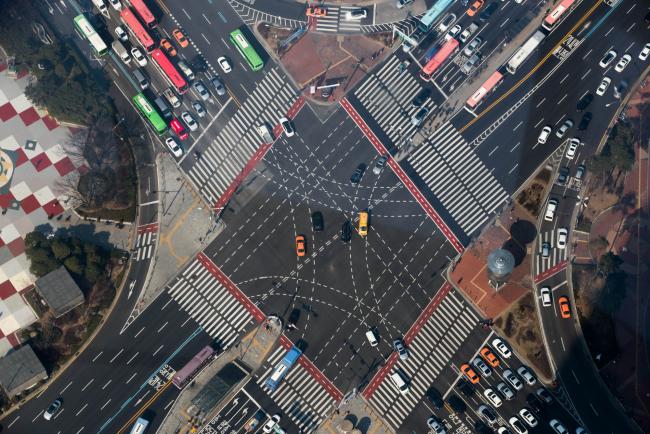(Bloomberg) -- Follow the latest global economic news and analysis @economics.
The Federal Reserve’s policy pivot took center stage in a busy week for central banks, with Chairman Jerome Powell declaring too-low inflation “one of the major challenges of our time.”
Here’s our wrap of what’s going on in the world economy.
Dare to Be Dovish
Growth risks are overwhelming economies across the globe and forcing central banks to rethink policy. The Fed somehow pulled off another dovish surprise, signaling no interest-rate hikes in 2019, though market reaction was mixed. That shift opens the door for rate cuts across Asia as inflation remains subdued and economic growth slows. For now, Indonesia and the Philippines — among the most aggressive rate hikers last year — kept policy on hold, as did Thailand. Central banks in Europe were similarly subdued, with the U.K., Switzerland and Iceland all maintaining rates, though Norway — fueled by oil riches — raised its benchmark for the second time since September and signaled there’s more to come.
Read More:
- Key ECB Stimulus Tool Is Put on Trial for Creating Problems
- Time to Relent on 2%? Japan Debates Inflation Target (NYSE:TGT): QuickTake
- India Needs to Stick to Path of Fiscal Prudence, RBI Chief Says
Growth, Lack Thereof
Exports are feeling more pain, and it’s not just the Chinese New Year: Taiwan, Japan, and South Korea marked consecutive months of big declines. Amid all the mystery of the Chinese economy’s trajectory, Bloomberg Economics sees reason to believe in second-quarter stability as stimulus measures start to pack a punch. In Europe, analysts reckon Italy’s recession stuck around this quarter, and there’ll be only weak growth after that. The Bundesbank has given up on a first-quarter German economic rebound, even as investors are a bit less pessimistic.
A spate of emerging-market elections are keeping economies on edge, including in Thailand, which goes to polls Sunday, and Indonesia. India’s animal spirits are waning weeks ahead of a vote there. A rare bright spot: U.K. and Australian employment are oddly strong amid all the risks, including an extremely volatile Brexit landscape that has Jamie Dimon worried.
Read More:
- GLOBAL INSIGHT: Uncertainty High, One Handed Economists Needed
- Time for Optimism on Europe? Goldman and Morgan Stanley (NYSE:MS) Think So
- Russia Ditches Real Income Data That Has Slumped for Five Years
Let’s Save a Deal
We know how much Donald Trump hates losing, and he’s scrambling to pin any whiff of a loss across the negotiating table. The U.S. president dialed up the trade-war tensions, saying he’ll keep tariffs intact until he’s sure China’s holding to an as-yet-nonexistent trade deal. Trump’s agriculture secretary was more generous in his assessment, calling the talks “dynamic.” U.S. negotiators are seeing Chinese officials push back a bit more on American demands, particularly on those sensitive issues like intellectual property protection.
Read More:
- Half the World Worries About Italy Getting Into Bed With China
- Iranians Line Up at Dawn for a Sanctions Meal They Can Afford
- EURO-AREA INSIGHT: No Deal Brexit? Who Has the Most to Lose
Weekend Reading
- For Global Growth Outlook, O’Neill Says Look to China’s Consumer
- Trump’s Economists See Themselves as Defenders Against Socialism
- Italy Woos Chinese Investment as Belt and Road Docks in Europe
- Princeton’s Krueger, Ex-Economic Aide to Obama, Dies at 58
- Almost Half of Female U.S. Economists Report Sex Discrimination
- EU State That’s Distant Home to Millions Needs Workers Back Fast
- Startups Lose in a Low-Rate World, and the Fed Is Blaming Itself
Chart of the Week
What You Need to Know About Modern Monetary Theory — and Why

